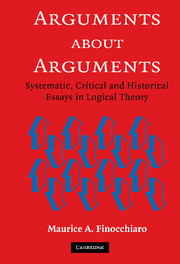Book contents
- Frontmatter
- Contents
- Preface and Acknowledgments
- Introduction : An Approach to a Branch of Logic
- Theorizing about reasoning and argument
- Fallacies and asymmetries
- Critiques
- Historical analyses
- 18 The Concept of Ad Hominem Argument in Galileo and Locke (1974)
- 19 Newton's Third Rule of Philosophizing : A Role for Logic in Historiography (1974)
- 20 Logic and Rhetoric in Lavoisier's Sealed Note : Toward a Rhetoric of Science (1977)
- 21 The Concept of Judgment and Huygens' Theory of Gravity (1980)
- 22 Empiricism, Judgment, and Argument : Toward an Informal Logic of Science (1988)
- 23 Criticism, Reasoning, and Judgment in Science (1995)
- Selected Bibliography
- Index
20 - Logic and Rhetoric in Lavoisier's Sealed Note : Toward a Rhetoric of Science (1977)
from Historical analyses
Published online by Cambridge University Press: 05 February 2015
- Frontmatter
- Contents
- Preface and Acknowledgments
- Introduction : An Approach to a Branch of Logic
- Theorizing about reasoning and argument
- Fallacies and asymmetries
- Critiques
- Historical analyses
- 18 The Concept of Ad Hominem Argument in Galileo and Locke (1974)
- 19 Newton's Third Rule of Philosophizing : A Role for Logic in Historiography (1974)
- 20 Logic and Rhetoric in Lavoisier's Sealed Note : Toward a Rhetoric of Science (1977)
- 21 The Concept of Judgment and Huygens' Theory of Gravity (1980)
- 22 Empiricism, Judgment, and Argument : Toward an Informal Logic of Science (1988)
- 23 Criticism, Reasoning, and Judgment in Science (1995)
- Selected Bibliography
- Index
Summary
The Role of Argument and Rhetoric in Science
The interrelations among argument, rhetoric, and philosophy are well known in rhetorical circles, at least in the sense that they are widely discussed and argued about. The same cannot be said of the interrelationships among argument, rhetoric, and science. This question has, however, had been recently touched upon by philosophers of science. The context has been the problem of scientific rationality and the question of whether the transition from one scientific theory to another can be made in a rational manner. The problem arose from the realization that, in the case of very fundamental scientific developments such as the Copernican revolution and the transition from classical to modern physics, purely logical considerations, rational argumentation, and appeals to the rules of scientific method are not enough to make a scientist change his mind. This realization was then generalized to conclude that the same limitation applies to all, or at least most, or at least the important and interesting, scientific developments. The generalization is I believe illegitimate, but it has generated a lot of discussion and confusion. The more conservative philosophers of science, feeling that the rationality of science was being threatened, have tended to counterargue that transitions from one theory to another can be and have historically been made in a logical manner, using as evidence the admittedly less problematic minor transitions or at least the less problematic aspects of the major transitions.
- Type
- Chapter
- Information
- Arguments about ArgumentsSystematic, Critical, and Historical Essays In Logical Theory, pp. 350 - 360Publisher: Cambridge University PressPrint publication year: 2005



